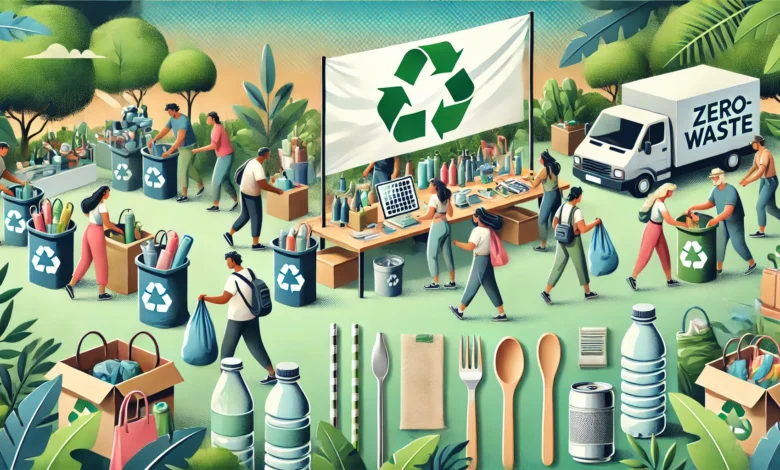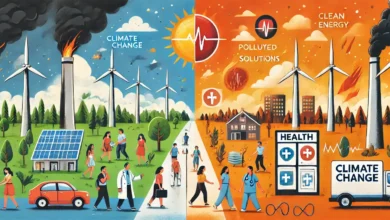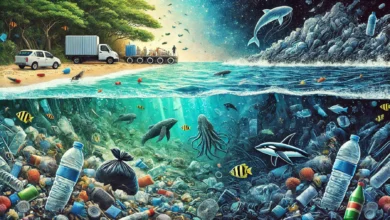10 Easy Steps to Start a Zero-Waste Lifestyle

Becoming a zero-waste lifestyle may feel daunting at first, but when you break it down into manageable chunks, it becomes an achievable goal for everybody. Whether you live in a big city or in an out-of-the-way part of a rural area, every journey starts with the first step, and from little things big things grow.
Contents
- 1 1. Do a Personal Waste Audit
- 2 2. Switch Your Single-Use Products for Reusable Products
- 3 3. Compost Your Organic Waste
- 4 4. Shop in Bulk to Reduce Packaging
- 5 5. Buy Secondhand
- 6 6. Repair Instead of Replace
- 7 7. Streamline Your Consumption Habit
- 8 8. Make Personal Care Products Sustainable
- 9 9. Advocate and Educate
- 10 10. Be Patient and Celebrate Your Progress
- 11 Frequently Asked Questions (FAQ)
1. Do a Personal Waste Audit
Before making your personal changes, it is helpful to do an inventory of how much waste you are generating, to begin with.
- For just one week, write down everything you put in the trash.
- Pay attention to patterns; do you see a lot of plastic containers? Food waste? Disposable packaging?
This awareness will serve as a first step in deciding which habits you will want to change first.
If you are interested in broader aiming towards environmental strategies as well, you might check out Climate Change Effects on the Environment.
2. Switch Your Single-Use Products for Reusable Products
You can start by switching your disposable products for reusable options:
- Reusable grocery shopping bags
- Stainless steel water bottles
- Glass or bamboo food storage containers
- Reusable straws and utensils
For individuals, the switch may seem relatively small, but in totality it reduces your waste stream considerably.
3. Compost Your Organic Waste
Food waste and yard waste do not have to go to the landfill. Composting converts organic matter into nutrient-rich soil.
- Start with a bin for your kitchen scraps.
- You may also want to look into backyard composting, or community compost services.
- If you live in an apartment, small, indoor composting systems are also available.
If you would like to be able to save water as well, check out Practical Water Conservation Methods You Can Start Today.
4. Shop in Bulk to Reduce Packaging
Purchasing bulk reduces unnecessary packaging waste. If the store permits, take your own containers with you.
- Grains, beans, nuts, and spices are all available in bulk.
- A lot of co-ops and eco-stores allow people to take their own reusable bags and jars to the store.
It may seem like a small change, but buying in bulk can result in a large decrease in trash generated each week.
5. Buy Secondhand
There is no waste in second-hand shopping. Plus, you’re likely to save money.
- Thrift shops, yard sales, and online marketplaces (like Facebook Marketplace, Kijiji, Varage Sale) are good sources.
- Focus on clothing, furniture, electronics, and even toys.
Keep in mind: The most sustainable item is one that’s already been made and exists.
6. Repair Instead of Replace
Learning some basic repair skills enables you to get more life out of your belongings.
- Sew small rips in clothing.
- Learn to repair simple appliances using tutorials.
- If you’re not comfortable DIYing, seek out a local repair shop.
Repair cafés and community workshops are becoming more popular in many cities as well, making it accessible for even more people.
7. Streamline Your Consumption Habit
Overconsumption creates waste. When you frame consumption through a minimalism lens, you may start to change your behavior:
- Focus on needs rather than wants.
- Wait 30 days before making a non-essential purchase.
- Quality over quantity.
Living a zero-waste lifestyle isn’t just about throwing less away; it’s about buying less to begin with.
8. Make Personal Care Products Sustainable
A lot of personal care products come with plastic packaging. Consider using products such as:
- Shampoo bars instead of bottled shampoo.
- A refillable deodorant system.
- Bamboo toothbrushes.
Simple swaps can help reduce what we contribute to landfill in the long run.
9. Advocate and Educate
Personal change matters, but change at a societal level creates real momentum.
- Share your personal zero-waste journey with your family and friends.
- Use your voice to advocate for local legislation aimed at reducing waste.
- Request businesses to promote bulk options or offer zero-waste packaging.
10. Be Patient and Celebrate Your Progress
Zero waste is a journey, not a one-day change.
- Some weeks will be more difficult than others.
- Every avoided plastic bag and every compost bin filled is a success.
- Celebrate small wins and keep your eyes on the prize!
For many people who are new to the concept of a zero-waste lifestyle, even the smallest of changes — like saying no to a plastic straw — can set off a chain of larger changes in how you live your life.
Frequently Asked Questions (FAQ)
How do I start living zero-waste on a budget?
Begin with swaps like reusable bags and reusable water bottles which are free! The goal should be to focus on consumption habits rather than spending money on expensive sustainable products.
Is zero waste really possible?
It rarely happens. But the goal is not perfection, but progress! Reducing waste by even 50% is still so helpful.
What is the easiest first step to take?
A personal audit of your waste and switching to reusable shopping bags can be two simple actions to take!
How does composting help with waste?
It simply diverts food and organic matter out of our landfill waste, reducing methane emissions in the process, and creating healthy soil.
Can families with kids do zero-waste?
Absolutely! Take your time and make one environmentally-friendly product swap at a time, like reusable snack bags, or choosing second-hand clothing for your kids. You’d be amazed how fast all those tender shoots of sustainability will grow into a lush forest garden!



